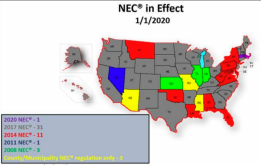FilterGuy
Solar Engineering Consultant - EG4 and Consumers
I was just researching the NEC and stumbled on something I did not know.
https://www.ul.com/news/2020-nec-addresses-electrical-safety-what-code-officials-need-know
Most of our DIY systems were not going to be 100% compliant anyway, but this sounds like it makes it impossible for a DIY to build an NEC compliant battery system... Is this other folks understanding as well?
For the most part I have learned that the NEC makes rules for good reason, but this sure feels like they were influenced by the makers of complete systems.
https://www.ul.com/news/2020-nec-addresses-electrical-safety-what-code-officials-need-know
Also, Section 706.5 has been revised to simply state that ESS are to be listed. This is a significant change because now an ESS must be listed as a complete energy storage system and is no longer permitted to be made up of a field assembly of listed components.
Most of our DIY systems were not going to be 100% compliant anyway, but this sounds like it makes it impossible for a DIY to build an NEC compliant battery system... Is this other folks understanding as well?
For the most part I have learned that the NEC makes rules for good reason, but this sure feels like they were influenced by the makers of complete systems.



